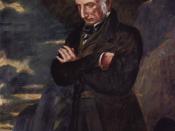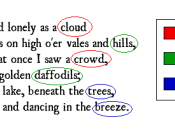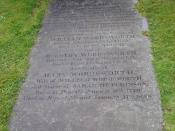This poem dramatizes the conflict between humans and their growing obsession over materials. The speaker's audiences are humans in general. He accuses them of "getting and spending"(2) all that they have, not saving or giving back. He then suggests that human greediness leads them to "lay waste to our powers"(2), probably referring to the losing their powers to be happy and their dominance over other species. By the line "Little we see in Nature that is ours" (3), the poet angrily states that people are losing their touch on both nature and the spiritual world. The next line describes people as being heartless ("we have given our hearts away"), and always taking things for granted (4).
This poem is a 14-line sonnet following the Petrarchan rhyme scheme of ABBAABBA, with the sestet, the last six lines following a rhyme scheme of CDCDCD. Each line is written in iambic pentameter, meaning there are ten syllables in each one.
The poet provides in answer to the conflict in the first eight lines in the sestet. His voice is one of distaste and disapproval. He writes about religion, showing that he is obviously Christian or Catholic by exclaiming "Great God!"(9).
The speaker personifies the Sea as baring her bosom to the moon, leaving her weak and being controlling by the moon. This compares to a human's increasing vulnerability caused by disputes of the possession of materials. The ongoing materialistic urges everyone gets are like "the winds that will be howling at all hours" (6). The speaker sadly notes that "we are out of tune"(8) with nature because of man's greedy and materialistic urges. He might mean that these characteristics will not help people in life or move them forward in the next line, "it moves us not" (9).
The speaker goes...


